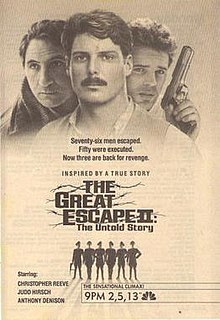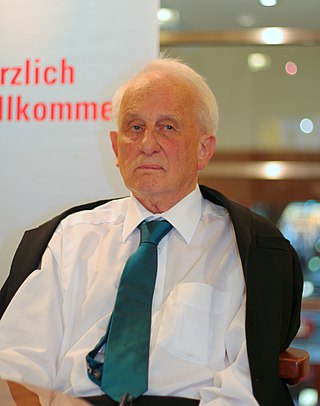
Rolf Hochhuth was a German author and playwright, best known for his 1963 drama The Deputy, which insinuates Pope Pius XII's indifference to Hitler's extermination of the Jews, and he remained a controversial figure both for his plays and other public comments and for his 2005 defense of British Holocaust denier David Irving.

Donald Henry Pleasence was an English actor. He began his career on stage in the West End before having a screen career, which included starring in a 1954 BBC adaptation of George Orwell's Nineteen Eighty-Four, before playing numerous supporting and character roles in films including RAF Flight Lieutenant Colin Blythe in The Great Escape (1963), the villain Ernst Stavro Blofeld in the James Bond film You Only Live Twice (1967), SEN 5241 in THX 1138 (1971), and the deranged Clarence "Doc" Tydon in Wake in Fright (1971).
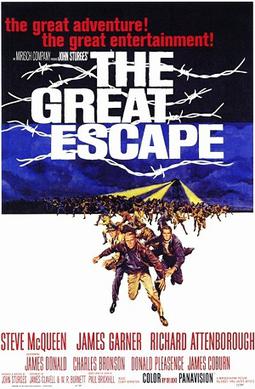
The Great Escape is a 1963 American epic war suspense adventure film starring Steve McQueen, James Garner and Richard Attenborough and featuring James Donald, Charles Bronson, Donald Pleasence, James Coburn, Hannes Messemer, David McCallum, Gordon Jackson, John Leyton and Angus Lennie. It was filmed in Panavision, and its musical score was composed by Elmer Bernstein.
Judson Taylor was an American actor, television director, and television producer.
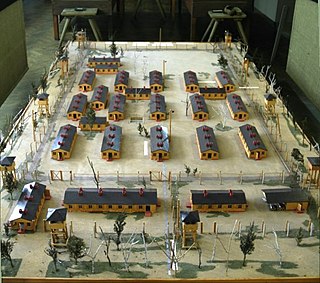
Stalag Luft III was a Luftwaffe-run prisoner-of-war (POW) camp during the Second World War, which held captured Western Allied air force personnel.
John George Pearson was an English novelist and an author of biographies, notably of Ian Fleming, of the Sitwells, and of the Kray twins.

The Cowra breakout occurred on 5 August 1944, when 1,104 Japanese prisoners of war attempted to escape from a prisoner of war camp near Cowra, in New South Wales, Australia. It was the largest prison escape of World War II, as well as one of the bloodiest. During the escape and ensuing manhunt, four Australian soldiers were killed and 231 Japanese soldiers were killed or committed suicide. The remaining escapees were re-captured and imprisoned.

Ronald William Lacey was an English actor. He made numerous television and film appearances over a 30-year period. His roles included Harris in Porridge (1977), Frankie in the Bud Spencer comedy Charleston (1978), SD agent Sturmbannführer Arnold Ernst Toht in Raiders of the Lost Ark (1981) and the Bishop of Bath and Wells in Blackadder II (1986).
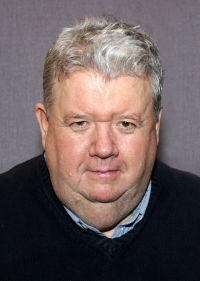
Ian McNeice is an English film and television actor, best known for playing Bert Large in the dramedy Doc Martin. He found fame portraying government agent Harcourt in the 1985 television series Edge of Darkness, and went on to feature in popular films such as The Englishman Who Went up a Hill but Came down a Mountain, Ace Ventura: When Nature Calls and Frank Herbert's Dune.
Squadron Leader Roger Joyce Bushell was a South African-born British military aviator. He masterminded the "Great Escape" from Stalag Luft III in 1944, but was one of the 50 escapees to be recaptured and subsequently murdered by the Gestapo.
Camp Papago Park was a prisoner of war (POW) facility located in Papago Park in the eastern part of Phoenix, Arizona, United States. It consisted of five compounds, four for enlisted men and one for officers. The property now is divided between the Papago Park Military Reservation, belonging to the Arizona National Guard, a city park, residential neighborhoods and a car dealer's lot.
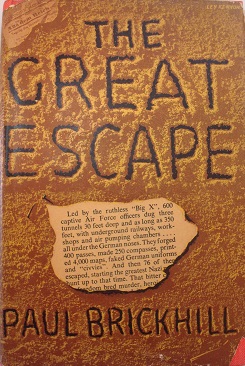
The Great Escape is a 1950 book by Australian writer Paul Brickhill that provides an insider's account of the 1944 mass escape from the German prisoner of war camp Stalag Luft III for British and Commonwealth airmen. As a prisoner in the camp, he participated in the escape plan but was debarred from the actual escape 'along with three or four others on grounds of claustrophobia'. The introduction to the book is written by George Harsh, an American POW at Stalag Luft III. This book was made into the 1963 film The Great Escape.
Major John Bigelow Dodge, also known as "the Artful Dodger", was an American-born British Army officer who fought in both world wars and became a notable prisoner of war during the Second World War, surviving The Great Escape.

The Stalag Luft III murders were war crimes perpetrated by members of the Gestapo following the "Great Escape" of Allied prisoners of war from the German Air Force prison camp known as Stalag Luft III on March 25, 1944. Of the 76 successful escapees, 73 were recaptured, most within several days of the breakout, 50 of whom were executed on the personal orders of Adolf Hitler. These executions were conducted within a short period following recapture.

The Hound of the Baskervilles is a 1983 British made-for-television mystery thriller film directed by Douglas Hickox, starring Ian Richardson as Sherlock Holmes and Donald Churchill as Dr. John H. Watson. It is based on Arthur Conan Doyle's 1902 novel The Hound of the Baskervilles.

John Wick: Chapter 2 is a 2017 American neo-noir action thriller film directed by Chad Stahelski and written by Derek Kolstad. The film is a sequel to John Wick (2014) and the second installment in the John Wick franchise. It stars Keanu Reeves as the eponymous character, alongside Common, Laurence Fishburne, Riccardo Scamarcio, Ruby Rose, Lance Reddick, Peter Stormare, Bridget Moynahan, Franco Nero, John Leguizamo, and Ian McShane. In the film, retired hitman John Wick is forced back into his old life to fulfill a blood oath to crime lord Santino D'Antonio (Scamarcio).

Zero Night: The Untold Story of the Second World War's Most Daring Great Escape is a 2014 book by Mark Felton. It is about the 1942 mass allied escape from the German prisoner-of-war camp Oflag VI-B.

The Exception is a 2016 romantic war film directed by David Leveaux and written by Simon Burke, based on Alan Judd's 2003 novel The Kaiser's Last Kiss. The film stars Jai Courtney, Lily James, Janet McTeer, and Christopher Plummer. The plot is a fictionalized account of the life of exiled Kaiser Wilhelm II (Plummer). When a Wehrmacht officer (Courtney) is ordered to determine whether or not a British spy has infiltrated the Kaiser's residence with a view to assassinating the deposed monarch, he falls in love with one of the Kaiser's maids (James) during his investigation. The film is set in occupied Netherlands during World War II.

Prom Night is a Canadian slasher film franchise that comprises a total of five feature films, the first four of which are centered around events at the fictional Hamilton High School. The first film, Prom Night (1980), was a slasher film directed by Paul Lynch and produced by Peter R. Simpson, focusing on teenagers being stalked and murdered by a masked killer at their prom. The film was a box-office success, grossing nearly $15 million. The following sequel, Hello Mary Lou: Prom Night II (1987), was envisioned as a standalone film, but producer Simpson and his company, Simcom, refitted it as a sequel to the original Prom Night. Hello Mary Lou: Prom Night II, a supernatural-themed slasher film, introduced the character of Mary Lou Maloney, a vengeful young woman who died on her prom night in 1957; its only connection to the first film was that both films take place in the same high school.
